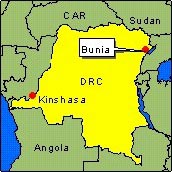KINSHASA, 21 February 2008 (IRIN) - The acquittal by a court in the Democratic Republic of Congo (DRC) of a militia leader convicted of war crimes has drawn criticism, with human rights activists saying the decision could set a bad precedent in a country where armed groups have committed atrocities against civilians with impunity. 
©IRIN
The Court of Appeal in Kisangani, capital of the northeastern Orientale Province, on 15 February acquitted Yves Panga Mandro Kahwa, former leader of Parti pour l'Unité et la Sauvegarde de l'Intégrité du Congo. The armed group was active in the volatile district of Ituri.
A military tribunal had in August 2006 sentenced Kahwa to 20 years' imprisonment after ruling that he had committed crimes against humanity between 15 and 16 October 2002, when 10 people died after he set fire to a health-centre, schools and churches in the Zumbe and Bedu Ezekere localities, 10km southeast of Bunia, the main town in Ituri.
The tribunal also ordered Kahwa to pay 14 victims of his crimes between US$2,500 and $75,000 in compensation.
"If it is on the basis of the amnesty law that the court arrived at the decision to acquit, then that law could give free rein to impunity and set a bad precedent for criminals to escape justice while the victims are abandoned without compensation and reparation," said Joel Bisubu, a human rights activist with an NGO known as Justice, based in Bunia.
The government and armed groups in Ituri signed peace agreements in 2006 outlining plans to disarm militia members, with the assistance of the UN Mission in the DRC (MONUC). In exchange, the government proposed an amnesty for the signatories and agreed to recognise officers from the groups.
MONUC also expressed its concern over the acquittal.
"The Court of Appeal based its decision on the grounds that all the offences are covered by the law on amnesty as acts of war and political offences. This unprecedented recourse to the amnesty law in the light of massacres of the civilian population, which could be characterised as crimes against humanity, is a worrying development in the fight against impunity in the DRC," said Kemal Saiki, MONUC spokesman, adding that the country's amnesty law did not provide for indemnity for suspects of crimes against humanity.
The prosecutor general of Kisangani, Nestor Botela, said he was prepared to lodge an appeal against Kahwa's acquittal, but he was waiting to study the law invoked by the Court of Appeal when it arrived at the decision.
"I expect that the law upon which the decision was based will be presented to me to see whether it conforms [to the amnesty law]," he added.
The judges who issued that verdict have, however, since been retired under an ongoing bid by President Joseph Kabila to restructure the judiciary.
The attorney general of Kisangani has to lodge an appeal against the ruling within 10 days from the date it was made, according to Chris Aberi, the prosecutor general of Ituri.
ei/jn/mw
Related articles
- • UN Security Council Calls on Rwanda to Stop Supporting M23 Rebels in DR Congo (February 22, 2025)
- • 'Deadly environment' plus 'political and social' obstacles hinder Ebola fight, Security Council hears (July 24, 2019)
- • Ebola outbreak declared an international Public Health Emergency (July 17, 2019)
- • Felix Tshisekedi Sworn In as DR Congo President (January 24, 2019)
- • Constitutional Court Declares Tshisekedi Winner of Presidential Election (January 19, 2019)
- • Felix Tshisekedi Vows to Be the President of All Congolese (January 10, 2019)
- • Felix Tshisekedi Elected DR Congo President (January 10, 2019)
- • DR Congo Delays Results of December Election (January 6, 2019)
- • At least 30 dead after massacres in Ituri (March 2, 2018)
- • Botswana Urges Joseph Kabila to Step Down (February 26, 2018)
- • No elections in DR Congo in December without electronic voting machines: INEC (February 13, 2018)
- • US Warns DR Congo Against Electronic Voting for Delayed Election (February 12, 2018)
- • Felix Tshisekedi accuses INEC of illegally prolonging Kabila's mandate (October 24, 2017)
- • DRC Seeks Arrest of Presidential Candidate Moise Katumbi (May 19, 2016)
- • Papa Wemba Is Buried in Kinshasa (May 4, 2016)
- • Papa Wemba Awarded Highest National Honor as Thousands Pay Tribute (May 2, 2016)
- • Rights Groups: DR Congo Must Free Pro-democracy Activists (April 13, 2015)
- • Police Open Fire on Crowd Protesting Election Law Change (January 19, 2015)
- • ICC Confirms 14-Year Sentence Against Thomas Lubanga (December 1, 2014)
- • Etienne Tshisekedi Evacuated to Belgium for Medical Treatment (August 16, 2014)
- • ICC sentences Germain Katanga to 12 years (May 23, 2014)
- • Kerry Calls on Kabila to Honor Constitution (May 4, 2014)
- • Kerry in DR Congo for Security Talks (May 3, 2014)
- • ICC finds Germain Katanga guilty of war crimes and crime against humanity (March 7, 2014)
- • DR Congo Takes Chairmanship of COMESA at Summit in Kinshasa (February 26, 2014)
- • Bosco Ntaganda Attacked Civilians on Ethnic Grounds, ICC Prosecutor Says (February 10, 2014)
- • DR Congo Honors Nelson Mandela, Hero and Model for Humanity (December 6, 2013)
- • Kabila Congratulates Congo Army for Defeating M23 Rebels (October 30, 2013)
- • DR Congo Eases Process for Starting a New Business (June 3, 2013)
- • Rebel Leader Bosco Ntaganda Makes First Appearence Before the ICC (March 26, 2013)
Tags: |







